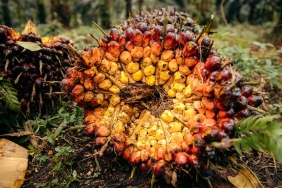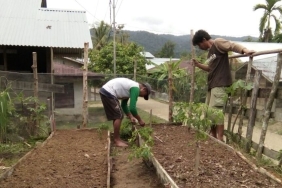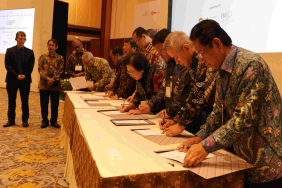ASEAN BANKS MUST PLAY A ROLE IN MITIGATING CLIMATE CHANGE RISKS TO ACHIEVE FOOD AND WATER SECURITY
Jakarta, September 12, 2018 - WWF released an annual report stating that the largest banks in the ASEAN region are increasingly aware of the impact of their business on the environment and society, but that awareness is slow to be transformed into action, despite the great potential to address climate change and finance sustainable food security, energy and infrastructure systems.
The ASEAN region is highly vulnerable to climate change that could worsen food and water security. The slower it transforms, the more banks will miss the opportunity to help drive sustainable development and mitigate climate change risks that could affect their balance sheet flows.
The report reveals that the ASEAN banking sector does not disclose how it manages climate change risks as recommended by the Taskforce for Climate-related Financial Disclosure (TCFD)-a taskforce initiated by G-20 countries. Of the 34 banks researched, only four have oversight of climate change risks and opportunities within their senior management ranks. In addition, none of the banks disclosed reviewing their portfolios or disclosing whether their portfolios were aligned with the Paris Agreement or Sustainable Development Goals (SDGs).
"The issue of sustainability is a real challenge for the financial sector, hence the government has issued sustainable finance rules in 2017. Financial services institutions should act seriously and demonstrate commitment through disclosure and transparency in their strategies, policies and implementation," said Rizkiasari Yudawinata, Sustainable Finance Manager, WWF-Indonesia.
The four Indonesian banks assessed in this report, namely BCA, Bank Mandiri, BNI and BRI, which are members of the First Movers on Sustainable Banking, have demonstrated their leadership through improved Environmental, Social and Governance (ESG) policies and procedures. For example, BNI and BRI have disclosed a palm oil financing policy resume and BNI has built an organizational structure that accommodates sustainable finance functions and tasks.
Only five banks recognized deforestation risk as a major contributor to climate change in their client activities and only two recognized water availability risk.
Peter Ferket, Chief Investment Officer of Robeco, which manages EUR 167 billion in assets, said, "We prioritize sustainability in the palm oil sector through the company, as well as a constructive dialog with ASEAN banks that finance the industry. This strategy allows us to reach a common solution to stop forest loss, prevent the exploitation of workers and contribute to sustainable economic development in ASEAN."
"Financial services institutions can join forces to start implementing sustainable finance and gain access to a range of benefits including capacity building to support operationally effective sustainable finance implementation," Rizkiasari added.
To fulfill a climate and sustainability commitment, banks must take concrete action. They must develop and disclose detailed ESG policies and procedures, including specific science-based criteria for key ESG risks. For example, banks implement 'no forest clearance' policies for land-based commodities and infrastructure.
###
Note to editors:
1. In Indonesia, eight banks have initiated the establishment of the Indonesia Sustainable Finance Initiative, which aims to increase proportionate market norms and take opportunities for banks to support climate change targets and SDGs. The initiative, established on May 31, 2018, is expected to catalyze improvements in banking and FSI practices for sustainable finance in Indonesia.
2. About the Sustainable Banking in ASEAN Report:
Access the full report in English here. This report is an updated version of WWF's 2017 Report "Sustainable Banking in ASEAN: On ASEAN FLAWS", a collaboration with the National University of Singapore (NUS), School of Business for Governance, Institutions and Organizations. The report benchmarks information from 34 banks across six ASEAN countries against indicators on sound corporate governance and the pillars of strong ESG integration. The report is supported by an online interactive platform (www.susba.org) that allows users to compare banks and indicators based on their preferences. For assessment purposes, the research used several reports from banks (available in English), such as their 2017 annual report, sustainability report, or CSR report released before July 3, 2018, as well as information posted on the company's website.
3. Findings in the report:
Banks in the ASEAN region do not disclose how they manage climate change risks in line with the recommendations of the Taskforce for Climate-related Financial Disclosure (TCFD)-a taskforce initiated by G-20 countries. In fact, of the 34 banks researched, only four disclosed that their senior management has oversight of climate change risks and opportunities, a key recommendation of the TCFD. Another finding was that none of the banks disclosed reviewing their portfolios for climate risks or disclosing whether their portfolios were aligned with the Paris Agreement or Sustainable Development Goals (SDG's).
4. Despite the drivers, the report finds that many banks' ESG policies remain weak and undisclosed, raising concerns. Some banks in Singapore, Malaysia and Thailand have shown progress in ESG integration, but disclosure of specific ESG-related requirements is still limited. A total of 19 banks disclosed that they have a standardized framework for ESG risk assessment but only seven disclosed that they have specific policies for sectors with high ESG risks. Even then, policy disclosure itself is limited, with only three banks sharing one or two of their key policies. Banks in the ASEAN Region must position themselves to capitalize on the opportunity for a low-carbon and sustainable development future.
Banks in the ASEAN Region are underscoring the opportunity in responding to climate change and the need for sustainable development, as 22 banks have developed green financial products such as green bonds and sustainability-related loans. However, these niche products are not sufficient for the large investments required to meet the Paris Agreement and SDGs by 2030. To properly capitalize on this opportunity, banks must set science-based targets to align their portfolios to a resource- and carbon-constrained world. The report also finds that banks in the ASEAN Region are not yet doing so, and are likely missing out on the opportunity, while they continue to be vulnerable to the upcoming transition and physical risks of climate change.
Banks play a critical role in financing the transition to sustainable food, energy and transportation systems and must be part of the solution. Responsible investors, as stewards of capital, need to ensure that the banks in their portfolios are also making timely progress in this regard, and are actively engaged to support the transition. As the ASEAN region experiences resilient and sustainable growth, banks must accelerate the pace of integrating ESG, including climate, deforestation and water risks into their core business strategies.
For more information, please contact:
Julien Anseau | Global Media Manager, WWF International | Email: [email protected] | +65 9060 1957
Rizkiasari Joedawinata | Sustainable Finance Manager, WWF Indonesia | Email: [email protected] |+62 811 234 4343





